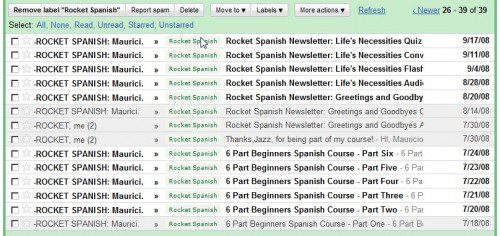
Are you learning a language programme online and feel you are not making the kind of progress you are hoping for? Are you speaking beyond just greeting words like hello, how are you, and basic expressions like “My name is….”? Are you interested in learning more than just the basic social greeting phrases but find yourself unable to chart or plan out a lesson for yourself? Do you google for more and more information about learning langauges online and still could not find your dream course? You might just be going through learning anxieties like I did.
I remember when I first signed up for my Spanish lessons, I thought I could have all problems of learning online solved forever. Then when the lessons started to fill up my page on my gmail account, I started to see lots of bold unopened emails and it just keeps getting larger. Even after I have downloaded all other language guides which I am already fluent in, like Mandarin, I have not been able to get revising more than one lesson a week.

The bold items are emails I have yet to read. For a full report on my Spanish lessons update in March, click on the picture.
It becomes clear to me that I am not going to make any progress beyond greeting if I want to learn online without leaving home. That is when I rediscover my learning styles. Here are some insights about this short journey.
Before you go on to google, yahoo and msn to search for online learning resources, answer the following questions about your learning styles. Are you a kinesthetic, audio or visual learner?
If you do not know which category you belong to, do an experiment on yourself. Pretend you are speaking in a foreign language to a local.
🙂
– Do you find yourself translating in your head what you want to say from your native language to the foreign language? If you do, you have to use the visual approach. You need to see charts, watch videos, have one-on-one lessons with a tutor or work with a group of other language learners.
🙂
– Do you always look for someone else to help you translate a foreign language for you even for the simplest thing that matters to you directly, like getting a drink for instance? If you do, you will be better off using the kinesthetic approach that is using an interpreter. This category of learners usually have little or no time to read books: busy executives, professional movie actors and actresses and even travelers. If you watch some of the documentaries on television which are shot on location in a foreign land, you will notice that the English reporter needs to use an interpreter or someone local to help them on the job. It is not because they are kinesthetic learner. It is because they have to build their content based on the foreign information which they have very little to spare to translate on their own. Hence, using a foreign interpreter is a necessary solution. It is not uncommon to find that many executives or professionals started to pick up the foreign language more quickly this way then when they were to do a full-time language course;
🙂
– Do you find yourself analyzing the knowledge that you have just learnt an hour ago? If so, you are drawn towards theories and will intuitively ask the right questions based on the past knowledge. You can spend hours just reading or digging deeper into the meaning of your knowledge. You are resourceful and feel confident about your own analysis. When the need arises for you to make use of the knowledge, you are not only able to apply it but also feel confident enough to teach the process of how you go about acquiring this skill to others. Sometimes, you happen to learn new things in this manner only for categories of knowledge like music or cooking; you find yourself struggling to learn in the same manner for other categories of knowledge for instance, singing, running or gardening. Nonetheless, most audio learners are very good listeners and tend to apply the knowledge after they have thorougly spend enough time understanding the basics.
🙂
– Does your present job require you to work online computer or telephone all the time? If so, you may study languages better in a classroom environment where you do get face to face coaching. Your attention will be shifted away from work and you get more focus and concentration. Several foreigners who work overseas prefer to engage tutors to teach them foreign languages. It gives them a sense of distance from the work environment, one-on-one personal attention and they have the flexibility to choose the time they want to spare that one-hour learning.
Google After You Know Your Learning Styles Or You’ll Be Wasting Time Online
🙂
So now when you have a fairly good idea of your learning styles and preferred methods, you can google for the information without wasting much time going through the search results that google offers. Enter your desired search phrases. Be as specific as possible: “chinese tutor online”, “chinese friends online”, “theories of languages”, use the inverted commas “search phrases” for the exact phrase that you are looking for.



Trackbacks/Pingbacks